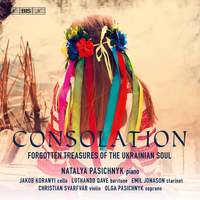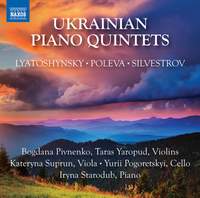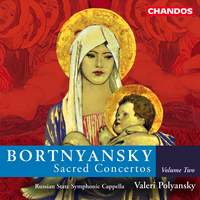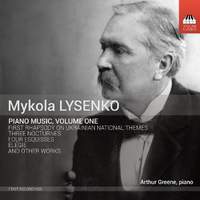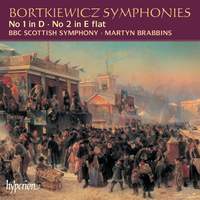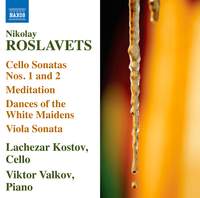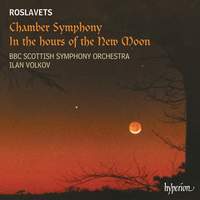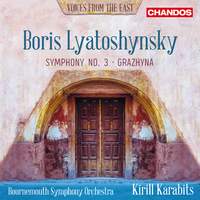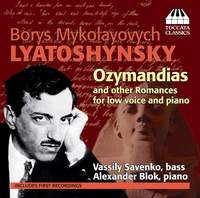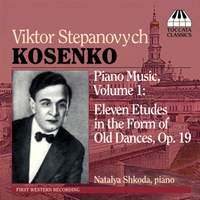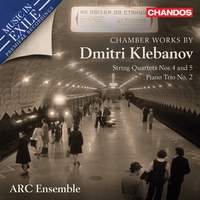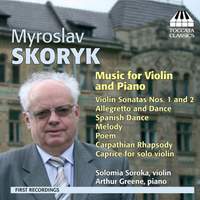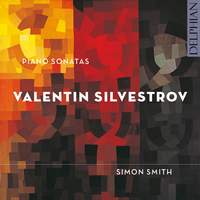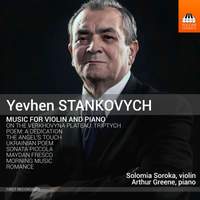Announcement,
Humanitarian Fundraiser for Ukraine
 Like virtually the entire classical music world, we are shocked and appalled by Russia’s invasion of Ukraine, and the subsequent humanitarian disaster unfolding before our eyes.
Like virtually the entire classical music world, we are shocked and appalled by Russia’s invasion of Ukraine, and the subsequent humanitarian disaster unfolding before our eyes.
Looking for a positive contribution we could make amid this catastrophe, we’ve been researching and exploring Ukrainian classical composers, and have discovered some fascinating stories and real gems. The fruits of this research are below for you to digest – two compilations, followed by a selection of albums of music by Ukrainian composers from the eighteenth century to the present day, listed chronologically with short biographies (for which thanks to my colleague in editorial, David Smith).
Most importantly, we’ve agreed with the featured labels (BIS, Chandos, Delphian, Hyperion, Naxos and Toccata) to use this initiative as a fundraiser, so they have donated the stock for us to sell at no cost (as well as covering royalties and copyrights) whilst we are absorbing the shipping and packaging costs ourselves, so that every penny of the income can go to supporting humanitarian causes in Ukraine. Neither Presto nor the record labels will take any money from the sales of these items.
Please help to spread the word and buy lots so that we can reach our target of raising £10,000 for the DEC Ukraine Humanitarian Appeal via the Red Cross
This initiative covers CDs/SACDs and downloads (with the sole exception of the BIS title Consolation: Forgotten Treasures of the Ukrainian Soul where we have not been able to secure inclusion of the download version – so please buy this one on SACD only).
We have also launched a similar campaign over in our sheet music department, so please make sure you take a moment to browse through our selection of publications by Ukrainian composers and to help us reach our target!
Natalya Pasichnyk (piano), Jakob Koranyi (cello), Luthando Qave (baritone), Emil Jonason (clarinet), Christian Svarfvar (violin), Olga Pasichnyk (soprano)
Available Formats: SACD, MP3, FLAC, Hi-Res FLAC
Bogdana Pivnenko (violin), Taras Yaropud (violin), Kateryna Suprun (viola), Yurii Pogoretskyi (cello), Iryna Starodub (piano)
Available Formats: CD, MP3, FLAC, Hi-Res FLAC
Dmytro Bortnyansky 1751-1825
Together with his contemporaries Artemy Vedel and Maxim Berezovsky, Bortnyansky was instrumental in laying the foundations for Ukrainian classical music in its current form; sometimes compared to the earlier Italian composer Palestrina, he pioneered liturgical composition and in particular the unique genre of the "choral concerto". This is not a concerto in the conventional sense of a soloist or group showcasing their virtuosity against an orchestral backdrop, but rather a multi-movement sacred work for unaccompanied choir which combines a broadly homophonic texture with polyphonic and solo elements. Alongside dozens such works, Bortnyansky also composed a number of operas (likely under the patronage of Baldassare Galuppi, who had moved from Italy to work at the court in St Petersburg) and instrumental works.
Russian State Symphonic Cappella, Valeri Polyansky
Available Formats: CD, MP3, FLAC
Mykola Lysenko 1842-1912
A folk-song collector in the vein of Vaughan Williams or Bartók, Lysenko was deeply interested in the indigenous music of his native country. He was also influenced by the Ukrainian nationalist and literary revivalist Taras Shevchenko, at whose funeral he served as a pallbearer. Due to imperial Russian decrees banning the use of the Ukrainian language in print, many of Lysenko's nationalist works (in particular his operas, which he insisted on writing exclusively in Ukrainian) were published abroad long before they became available in Ukraine. His Taras Bulba, telling the tale of the controversial Cossack from Gogol's novel of the same name, was not staged in Moscow until well into the Soviet era, due to Lysenko's strict linguistic stipulations.
Arthur Greene (piano)
Available Formats: CD, MP3, FLAC, Hi-Res FLAC
Sergei Bortkiewicz 1877-1952
Like many others, Bortkiewicz fled the Russian Revolution and suffered personal tragedy as a result of its chaos; he initially reestablished himself in Constantinople (today's İstanbul) and worked alongside the Ottoman Sultan's court pianist to rebuild his musical life. With the aid of the Yugoslavian ambassador he then moved to Vienna, which would remain his base for the rest of his life and where he is now buried. Although the upheavals and destruction of the Second World War would have a great impact on him, he continued to compose throughout and after it, with an acclaimed performance of his first symphony, mere months before his death in 1952, seemingly giving him a sense of long-sought vindication as a composer.
We have now sold out of the free stock kindly donated by the label. However we will continue to donate our profits from any sales if you purchase this CD
BBC Scottish Symphony Orchestra, Martyn Brabbins
Available Formats: MP3, FLAC
Nikolai Roslavets 1880-1944
The contested history of Roslavets's time has muddied even the details of his birth; it is thought that he misrepresented his own background in at least one biography in order to establish his proletarian credentials and head off political attacks. A committed modernist, he flourished in the early post-Revolutionary atmosphere and penned the first Russian article on Schoenberg's Pierrot Lunaire. Before long, however, as the mood changed across the Soviet Union and such artistic experimentation fell out of political favour, his unrepentant desire for musical progress and complexity led to him being shunned and forced to offer public self-criticism. Despite a period of moderate success working in Tashkent (in today's Uzbekistan), Roslavets never truly rehabilitated himself and was largely excluded from Soviet musical life.
Lachezar Kostov (cello). Viktor Valkov (piano)
Available Formats: CD, MP3, FLAC
BBC Scottish Symphony Orchestra, Ilan Volkov
Available Formats: CD, MP3, FLAC
Boris Lyatoshynsky 1895-1968
Initially drawing on the legacy of Tchaikovsky, Glazunov and Scriabin, Lyatoshynsky seemed at first to be set on a musical trajectory of increased radicalism, exploring impressionistic and other styles. However, by the mid-1920s he had shifted his approach (perhaps partly in response to the guiding artistic ideology of the Soviet state) and took a far greater interest in folk music, particularly that of his native Ukraine. Even so, his modernist impulses were never far away, with a dark and disturbing Second Symphony that coincided with the furore around Shostakovich's notorious Fifth and earned Lyatoshynsky a similar rebuke – in this case pre-emptive, as word had got out even before the premiere was due to take place. His Third Symphony likewise garnered harsh headlines due to its message that "peace will always defeat war", and Lyatoshynsky was forced to rework its finale into a suitably victorious triumph.
Bournemouth Symphony Orchestra, Kirill Karabits
Available Formats: SACD, MP3, FLAC, Hi-Res FLAC
Vassily Savenko (bass) & Alexander Blok (piano)
Available Formats: CD, MP3, FLAC
Viktor Kosenko 1896-1938
A child prodigy and gifted pianist, Kosenko established himself primarily as a teacher of the piano and music theory, performing his own works and those of other Ukrainian composers – Lyatoshynsky, Revutskiy and others. He came into ideological conflict with the Stalin regime, but seems to have been able to mitigate the worst of this by relocating to Kyiv. His work in promoting a Ukrainian musical identity (even if seen through a Soviet lens) was tireless, and eventually saw him recognised and decorated by Nikita Khrushchev – at that time the First Secretary of the Communist Party of Ukraine. He died young, aged only 42, and much of his legacy today is due to the work of his widow Angelina in promoting his music.
Natalya Shkoda (piano)
Available Formats: CD, MP3, FLAC
Dmitri Klebanov 1907-1987
Klebanov's musical career got off to an inauspicious start, with a first symphony dedicated (like Shostakovich's later Thirteenth) to the victims of the Babi Yar massacre during the Holocaust. As with Shostakovich and the poet Yevtushenko whose texts he set, the Soviet authorities deemed a furious musical denunciation of anti-Semitism unpatriotic, and Klebanov was singled out for a particularly scathing dressing-down. Although he escaped official punishment he was forced into internal exile for three decades, composing many loyalist works dedicated to the Party and its hagiography. The Khrushchev thaw offered hope of at least partial rehabilitation, but conditional on joining the Communist Party; Klebanov declined. The later cultural relaxation of the 1980s seemed as if it would finally allow him to return to the fold, but his death in 1987 prevented this from coming to fruition.
Arc Ensemble
Available Formats: CD, MP3, FLAC, Hi-Res FLAC
Myroslav Skoryk 1938-2020
Born in Lviv (at the time part of Poland, as it had been for long periods of its earlier history), Skoryk remained associated with the western Ukrainian city for most of his life – carrying out initial musical studies there in his teens, following his family's return from internal deportation to Siberia, then returning to teach there himself after a spell as a postgraduate at the Moscow Conservatory. Like Lysenko, he took an interest in the early trailblazers of Ukrainian literary culture – in this case the late nineteenth-century writer and activist Ivan Franko, whose texts he set in the cantata Vesna (Spring) in his final year as an undergraduate at Lviv Conservatory. In his later years, Skoryk held posts at the Kyiv Opera and the National Union of Composers of Ukraine.
Solomia Soroka (violin) & Arthur Greene (piano)
Available Formats: CD, MP3, FLAC
Valentin Silvestrov b.1937
A politically engaged composer throughout his career, Silvestrov made waves by walking out of a composers' meeting in protest at the Soviet invasion of Czechoslovakia, and by publicly sticking to his guns when subsequently pressured to apologise. Taught by Lyatoshynsky among others, he traced a musical arc not dissimilar to some post-Soviet Baltic composers – an initial fascination with the radical avant-garde, over time supplanted by a renewed appreciation for tonality and tendencies towards the sacred. His 1995 Diptych sees him at perhaps his most nationalistic – setting Shevchenko's stirring poetic rallying-cry Zapovit (Testament) and subsequently rededicated to the memory of the first casualty in the 2014 Ukrainian Revolution. In early March 2022 Silvestrov was evacuated to neighbouring Poland through the efforts of pianist Alexei Lubimov and journalists from Deutsche Welle.
Simon Smith (piano)
Available Formats: CD, MP3, FLAC, Hi-Res FLAC
Yevhen Stankovych b.1942
A pupil of both Lyatoshynsky and Skoryk, Stankovych is a primarily orchestral composer, drawing on Ukrainian folk idioms but with a considerable output of contemporary film scores to his name as well. After several initial setbacks – a local school offering only trumpet and accordion classes, a disruptive conscription into the Soviet Army in the middle of his studies at the Lviv Conservatoire and the death of his first compositional mentor – he eventually established himself as both a music editor and a film composer, the latter providing a steady source of income until the Soviet cinema scene disintegrated alongside the Union itself in 1991. Upon Ukrainian independence that same year, he moved to Kyiv and has since composed a number of large-scale works.
Solomia Soroka (violin) & Arthur Greene (piano)
Available Formats: CD, MP3, FLAC, Hi-Res FLAC


